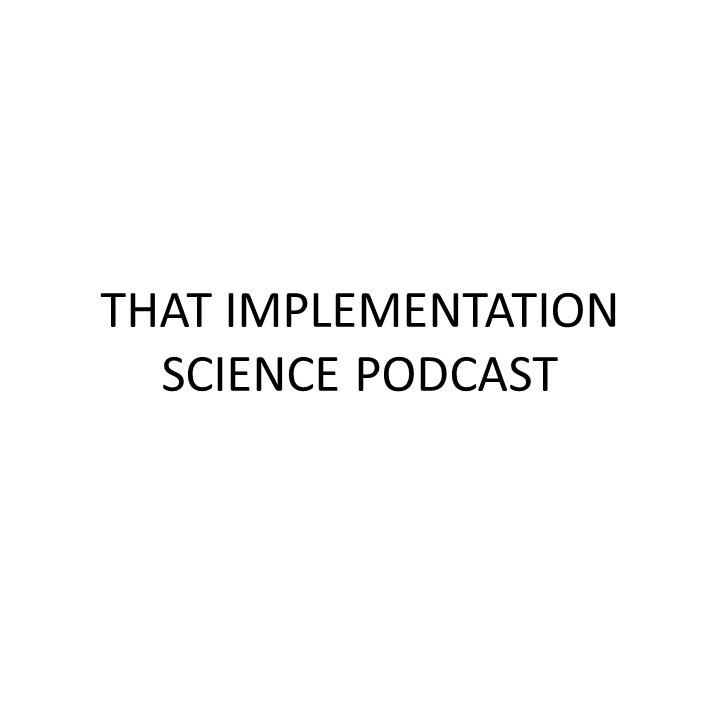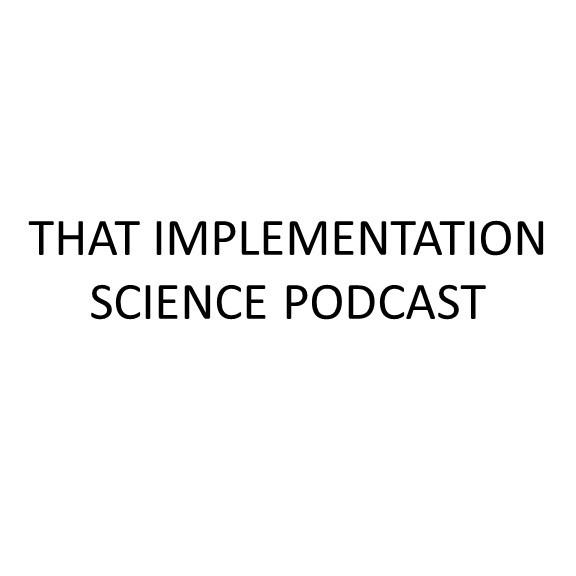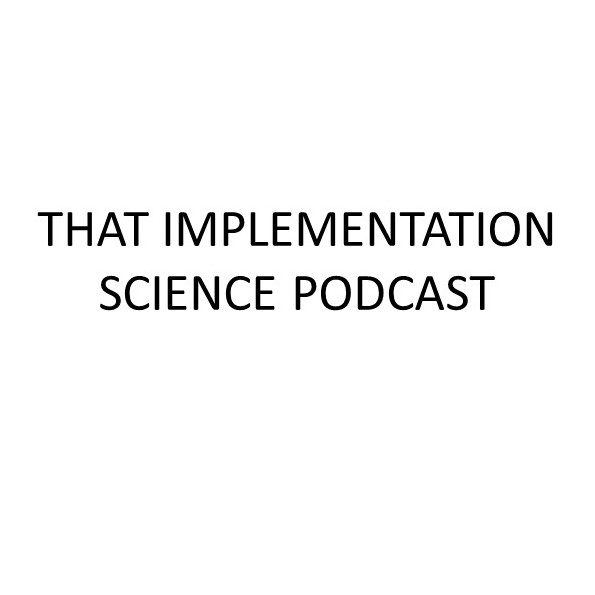Discover That Implementation Science Podcast
That Implementation Science Podcast

That Implementation Science Podcast
Author: Mike Pullmann
Subscribed: 11Played: 58Subscribe
Share
© Copyright 2023 All rights reserved.
Description
The innovation to implementation gap is 17 years. Podcasts were invented 17 years ago. Coincidence? We don’t think so. That Implementation Science Podcast discusses everything related to Implementation Science, and many things not. Co-hosts Mike Pullmann and Kevin King interview guests, review new research, and implement solutions to things that aren’t even problems yet.
21 Episodes
Reverse
We talk with Sara Landes about how she became interested in implementation science, her work in the Department of Veterans Affairs, hybrid trials, and her fond memories of a special rental car company. Then we get Sara started on a rant about hybrid trial reviews.
The views expressed by Dr. Landes in this podcast are those of Dr. Landes and do not reflect the position or policy of the Department of Veterans Affairs or the United States Government.
Bauer, M. S., & Kirchner, J. (2020). Implementation science: What is it and why should I care?. Psychiatry research, 283, 112376. https://doi.org/10.1016/j.psychres.2019.04.025
This is the second of two episodes where Kevin King and I conduct short interviews with several Early Career Researchers at last year’s ABCT conference in Seattle. On this episode, we first interview Noah Triplett, discussing his work in the juvenile justice system on diversion and flexible facilitation and implementation of MH services in Kenya. Second, we interview Kayla Farise, who will describe her work with implementing services for families experiencing homelessness, Parent Child Interaction Therapy and cultural factors associated with intervention fidelity. Lastly, we talk with Margaret Crane, who describes her work on implementation policy, financing, and organizational factors associated with implementation success.
https://healthpolicyresearch-scholars.org/scholars/noah-triplett/
https://www.kaelafarrise.com/
https://psych.med.brown.edu/people/margaret-crane-phd
Today, we’ll have a conversation with a collection of some of the greatest minds in implementation science about the operationalization of the two most important constructs in Implementation Science: interventions and implementation strategies. Sounds easy, right? In the 20-odd years that Implementation Science has been around, we’ve figured this out, haven’t we? Not really. Today’s show is a recording from an informal discussion of council of experts including Aaron Lyon, Bryan Weiner, Cara Lewis, Pedja Klasnja, Byron Powell, Shannon Dorsey, Rosemary Meza, and Kevin King.
Referenced during today's show:
Curran, G.M. Implementation science made too simple: a teaching tool. Implement Sci Commun 1, 27 (2020). https://doi.org/10.1186/s43058-020-00001-z
Eldh, A.C., Almost, J., DeCorby-Watson, K. et al. Clinical interventions, implementation interventions, and the potential greyness in between -a discussion paper. BMC Health Serv Res 17, 16 (2017). https://doi.org/10.1186/s12913-016-1958-5
This is the first of two episodes where Kevin King and I conduct short interviews with several Early Career Researchers at last year’s ABCT conference in Seattle. On this episode, we first interview Mallory Dobias, whose work focuses on improve teen access to mental health supports using digital technologies, and empowering young people in interventions. Second, we’ll interview Andrea Ng, who will describe her work on a measurement feedback system for school therapists.
Welcome to Season 2! On today's show, we interview David Chambers, the Deputy Director for Implementation Science in the National Cancer Institute. We’ll talk about the history of implementation science, the false notion of science in a vacuum, the role of creativity in science, what makes a good meeting, how teams are like jam bands, and you’ll get to test your knowledge of Frank Zappa against David’s.
Mentioned during the show:
Proctor, E. K., Powell, B. J., Baumann, A. A., Hamilton, A. M., & Santens, R. L. (2012). Writing implementation research grant proposals: ten key ingredients. Implementation Science, 7, 1-13.
Curran, G.M. Implementation science made too simple: a teaching tool. Implementation Science Communications 1, 27 (2020). https://doi.org/10.1186/s43058-020-00001-z
The amazing and generous Shannon Dorsey swings by the podcast to talk about her work on pragmatic and applied implementation science, including implementing in low resource and international settings, how to build trust and working community partnerships, and putting jargon into plain language. Along the way we quiz her about bad national park yelp reviews and I give a horribly inaccurate summary of a paper I last read 20 years ago. Referenced during today's show:
Dorsey, S., Johnson, C., Soi, C., Meza, R. D., Whetten, K., & Mbwayo, A. (2023). Implementation science in plain language: The use of nonjargon terms to facilitate collaboration. Implementation Research and Practice, 4. https://doi.org/10.1177/26334895231177474
Beidas, R.S., Dorsey, S., Lewis, C.C. et al. Promises and pitfalls in implementation science from the perspective of US-based researchers: learning from a pre-mortem. Implementation Sci 17, 55 (2022). https://doi.org/10.1186/s13012-022-01226-3
Costello EJ, Compton SN, Keeler G, Angold A. Relationships Between Poverty and Psychopathology: A Natural Experiment. JAMA. 2003;290(15):2023–2029. doi:10.1001/jama.290.15.20
Westerlund, A., Sundberg, L., & Nilsen, P. (2019). Implementation of Implementation Science Knowledge: The Research-Practice Gap Paradox. Worldviews on evidence-based nursing, 16(5), 332–334. https://doi.org/10.1111/wvn.12403
Pedja Klasnja swings by the show to discuss his viewpoints as a methodologist on the outskirts of Implementation Science, from the standpoint of Human-Computer Interaction and Health Informatics. At some point in the show Kevin falls in love with Pedja, but we're not sure if Pedja noticed.
Referenced in this episode:
Kilbourne, A.M., Geng, E., Eshun-Wilson, I. et al. How does facilitation in healthcare work? Using mechanism mapping to illuminate the black box of a meta-implementation strategy. Implement Sci Commun 4, 53 (2023). https://doi.org/10.1186/s43058-023-00435-1
Jill Locke visits the show to talk about her fascinating work at developing and re-designing interventions for Autistic youth in educational settings. She talks about community engagement strategies, human-centered design, leadership considerations, and more. Along the way, she competes in our quiz for a shot at Kevin King writing an out of office autoreply for her email by trying to finish several Disney tunes.
Mike and Kevin discuss the paper "Improving the feasibility of fidelity measurement for community-based quality assurance". Can measuring fidelity be cheap, fast, and good?
Referenced in today's episode:
Chapman, J. E., Alley, Z. M., & Schoenwald, S. K. (2022). Improving the feasibility of fidelity measurement for community-based quality assurance: Partial- versus full-session observations of supervisor adherence and competence. Implementation Research and Practice, 3. https://doi.org/10.1177/26334895221135263
Aaron Lyon from the University of Washington swings by the show to discuss the integration of User-Centered Design into Implementation Science, beer, developing leadership strategies in educational settings, pre-implementation motivational interventions, and more beer.
We talk with Cara Lewis about implementation mechanisms, quiz her about boats, and learn about her fancy new job.
We interview Leopoldo Cabassa and Dani Adams about implementation sciences' role in Psychedelic Assisted Therapy. We talk about the evidence for psychedelic assisted therapy, its implementation barriers and facilitators, the role of implementation science in moving psychedelic assited therapy from the clinic to the field, and we'll get them started on some excellent rants about implementation science. Discussed during the show:
Trickett, E. J. (2011). From “water boiling in a Peruvian town” to “letting them die”: Culture, community intervention, and the metabolic balance between patience and zeal. American Journal of Community Psychology, 47, 58-68.
Raghavan, R., Bright, C. L., & Shadoin, A. L. (2008). Toward a policy ecology of implementation of evidence-based practices in public mental health settings. Implementation Science, 3, 1-9.
Palinkas, L. A., Allred, C. A., & Landsverk, J. A. (2005). Models of research-operational collaboration for behavioral health in space. Aviation, space, and environmental medicine, 76(6), B52-B60.
https://socialwork.columbia.edu/directory/heidi-l-allen
https://sites.wustl.edu/centerforpsychedelics/
@daniadams
We talk with the nicest person in Implementation Science, Byron Powell about how his dream of being a high school social worker and basketball coach was derailed by the irresistible siren song of implementation science, the meaning of interventions and implementation strategies, the utility of mechanism diagramming using approaches like logic models and causal pathway diagrams, and Kevin and I get Byron started on a rant about implementation science. Contact Byron @byron_powell on X
Discussed during today's show:
Geng, E. H., Nash, D., Phanuphak, N., Green, K., Solomon, S., Grimsrud, A., Sohn, A. H., Mayer, K. H., Bärnighausen, T., & Bekker, L. G. (2022). The question of the question: impactful implementation science to address the HIV epidemic. Journal of the International AIDS Society, 25(4), e25898. https://doi.org/10.1002/jia2.25898
Powell, B.J., Waltz, T.J., Chinman, M.J. et al. A refined compilation of implementation strategies: results from the Expert Recommendations for Implementing Change (ERIC) project. Implementation Sci 10, 21 (2015). https://doi.org/10.1186/s13012-015-0209-1
Pullmann, M. D., Dorsey, S., Duong, M. T., Lyon, A. R., Muse, I., Corbin, C. M., Davis, C. J., Thorp, K., Sweeney, M., Lewis, C. C., & Powell, B. J. (2022). Expect the Unexpected: A Qualitative Study of the Ripple Effects of Children's Mental Health Services Implementation Efforts. Implementation research and practice, 3, 26334895221120797. https://doi.org/10.1177/26334895221120797
Smith, J. D., Li, D. H., Merle, J. L., Keiser, B., Mustanski, B., & Benbow, N. D. (2024). Adjunctive interventions: change methods directed at recipients that support uptake and use of health innovations. Implementation science : IS, 19(1), 10. https://doi.org/10.1186/s13012-024-01345-z
We talk with Stephen Schueller about digital mental health apps, the challenges and benefits of doing implementation science work in a digital landscape, the implementation factors worthy of consideration when conducting digital mental health research, and chocolate and broccoli but not chocolate covered broccoli. Best of all, Kevin and I get Stephen started on an amazing rant about Johnathan Haidt’s book, the Anxious Generation.
Mentioned:
Proctor, E., Ramsey, A. T., Saldana, L., Maddox, T. M., Chambers, D. A., & Brownson, R. C. (2022). FAST: a framework to assess speed of translation of health innovations to practice and policy. Global Implementation Research and Applications, 2(2), 107-119.
Curran, G. M. (2020). Implementation science made too simple: a teaching tool. Implementation Science Communications, 1, 1-3.
Curran, P. G., & Hauser, K. A. (2019). I’m paid biweekly, just not by leprechauns: Evaluating valid-but-incorrect response rates to attention check items. Journal of Research in Personality, 82, 103849.
On this episode we talk with everyone's favorite mentor, Bryan Weiner, about the history of implementation science, implementation science measurement, the Jingle Jangle Fallacy, and we quiz him on how to be a good mentor. Resources discussed during this episode include:
Weiner, B. J., Lewis, C. C., Stanick, C., Powell, B. J., Dorsey, C. N., Clary, A. S., Boynton, M. H., & Halko, H. (2017). Psychometric assessment of three newly developed implementation outcome measures. Implementation science : IS, 12(1), 108. https://doi.org/10.1186/s13012-017-0635-3
Proctor, E., Silmere, H., Raghavan, R., Hovmand, P., Aarons, G., Bunger, A., Griffey, R., & Hensley, M. (2011). Outcomes for implementation research: conceptual distinctions, measurement challenges, and research agenda. Administration and policy in mental health, 38(2), 65–76. https://doi.org/10.1007/s10488-010-0319-7
Lane-Fall, M.B., Curran, G.M. & Beidas, R.S. Scoping implementation science for the beginner: locating yourself on the “subway line” of translational research. BMC Med Res Methodol 19, 133 (2019). https://doi.org/10.1186/s12874-019-0783-z
Practical Implementation Science: Moving Evidence Into Action Edited by: Weiner, Bryan J., PhD | Lewis, Cara C., PhD | Sherr, Kenneth, PhD https://www.amazon.com/Practical-Implementation-Science-Moving-Evidence/dp/0826186920
On this episode we interview… co-host Kevin King! What?!? Again with the bro talk? Apologies to everyone in our audience but look on the bright side, you can use this time again to catch up on old Webster episodes. If you do listen, we’ll talk about the etiology of substance use and substance use disorders, examining training and education of research methods through an implementation science lens, and quiz Kevin on his knowledge of Star Wars.
Dora, J., Piccirillo, M., Foster, K. T., Arbeau, K., Armeli, S., Auriacombe, M., ... & King, K. M. (2023). The daily association between affect and alcohol use: A meta-analysis of individual participant data. Psychological Bulletin, 149(1-2), 1.
Dora, J., Schultz, M. E., Shoda, Y., Lee, C. M., & King, K. M. (2022). No evidence for trait-and state-level urgency moderating the daily association between negative affect and subsequent alcohol use in two college samples. Brain and Neuroscience Advances, 6, 23982128221079556.
Feil, M., Halvorson, M., Lengua, L., & King, K. M. (2020). A state model of negative urgency: Do momentary reports of emotional impulsivity reflect global self-report?. Journal of Research in Personality, 86, 103942.
Halvorson, M. A., Pedersen, S. L., Feil, M. C., Lengua, L. J., Molina, B. S., & King, K. M. (2021). Impulsive states and impulsive traits: A study of the multilevel structure and validity of a multifaceted measure of impulsive states. Assessment, 28(3), 796-812.
King, K. M., Feil, M. C., Halvorson, M. A., Kosterman, R., Bailey, J. A., & Hawkins, J. D. (2020). A trait-like propensity to experience internalizing symptoms is associated with problem alcohol involvement across adulthood, but not adolescence. Psychology of Addictive Behaviors, 34(7), 756.
King, K. M., Pullmann, M. D., Lyon, A. R., Dorsey, S., & Lewis, C. C. (2019). Using implementation science to close the gap between the optimal and typical practice of quantitative methods in clinical science. Journal of abnormal psychology, 128(6), 547–562. https://doi.org/10.1037/abn0000417
Kummerfeld, E., & Jones, G. L. (2023). One data set, many analysts: Implications for practicing scientists. Frontiers in psychology, 14, 1094150. https://doi.org/10.3389/fpsyg.2023.1094150
On this show co-host Kevin King will interview… Mike! Apologies in advance to anyone who is tired of hearing us talk about our work—honestly your time might be better spent watching old reruns of Webster. We talk about equity in education, the unintended consequences of implementation strategies, the ethics and obligations of conducting community based research, and Kevin quizzes Mike on his knowledge of rock climbing.
Discussed during today's show:
Ripple effects website: https://depts.washington.edu/ripple-effects/
Pullmann, M. D., Dorsey, S., Duong, M. T., Lyon, A. R., Muse, I., Corbin, C. M., Davis, C. J., Thorp, K., Sweeney, M., Lewis, C. C., & Powell, B. J. (2022). Expect the Unexpected: A Qualitative Study of the Ripple Effects of Children's Mental Health Services Implementation Efforts. Implementation research and practice, 3, 26334895221120797. https://doi.org/10.1177/26334895221120797
My favorite paper that has zero attention: Pullmann M. D. (2011). Effects of out-of-home mental health treatment on probability of criminal charge during the transition to adulthood. The American journal of orthopsychiatry, 81(3), 410–419. https://doi.org/10.1111/j.1939-0025.2011.01109.x
My least favorite paper with lots of attention: Pullmann, M. D., VanHooser, S., Hoffman, C., & Heflinger, C. A. (2010). Barriers to and supports of family participation in a rural system of care for children with serious emotional problems. Community mental health journal, 46(3), 211–220. https://doi.org/10.1007/s10597-009-9208-5
Digital therapeutics and AI may be the future, but hearing two white dudes drone on about it is very much the now. Listen to Kevin and Mike take their best stab. Papers referenced include:
Damschroder, L.J., Reardon, C.M., Widerquist, M.A.O. et al. The updated Consolidated Framework for Implementation Research based on user feedback. Implementation Sci 17, 75 (2022). https://doi.org/10.1186/s13012-022-01245-0
Lin, Z., Althoff, T., & Leskovec, J. (2018). I'll Be Back: On the Multiple Lives of Users of a Mobile Activity Tracking Application. Proceedings of the 2018 World Wide Web Conference.
Mohr D, Lyon A, Lattie E, Reddy M, Schueller S. Accelerating Digital Mental Health Research From Early Design and Creation to Successful Implementation and Sustainment. Journal of Medical Internet Research 2017;19(5):e153 URL: https://www.jmir.org/2017/5/e153 DOI: 10.2196/jmir.7725
Lisa Saldana joins the show to talk about the importance of measuring and planning implementation stages and how they can help improve whether the implementation of your program will be sustained; the relative importance of engagement, readiness planning, and how good pre-implementation planning can make programs robust to challenges; the overlap between getting an implementation ready to do and behavior change at the person level and how it parallels behavior change at the organizational level; the importance of research networks, learning across multiple fields, and maintaining engagement with both your end users and your fellow scientists; and, we quiz Lisa on her knowledge of Eugene, Oregon. Lisa’s work is some of the most exciting, important, and interesting research in implementation science today.
Alley, Z. M., Chapman, J. E., Schaper, H., & Saldana, L. (2023). The relative value of Pre-Implementation stages for successful implementation of evidence-informed programs. Implementation Science, 18(1), 1-13.
Saldana, L., Chamberlain, P., Wang, W., & Hendricks Brown, C. (2012). Predicting program start-up using the stages of implementation measure. Administration and Policy in Mental Health and Mental Health Services Research, 39, 419-425.
Chamberlain, P., Brown, C. H., & Saldana, L. (2011). Observational measure of implementation progress in community based settings: the stages of implementation completion (SIC). Implementation Science, 6(1), 1-8.
Saldana, L., Chamberlain, P., Bradford, W. D., Campbell, M., & Landsverk, J. (2014). The cost of implementing new strategies (COINS): a method for mapping implementation resources using the stages of implementation completion. Children and youth services review, 39, 177-182.
Beidas, R. S., Saldana, L., & Shelton, R. C. (2023). Testing psychosocial interventions in the contexts they are meant to be delivered. Journal of Consulting and Clinical Psychology.
NCI Implementation Primer: https://cancercontrol.cancer.gov/sites/default/files/2020-07/NCI-ISaaG-Workbook.pdf
Practical IS Textbook from Brian Weiner: https://www.springerpub.com/practical-implementation-science-9780826186928.html
Wong, D.R., Schaper, H. & Saldana, L. Rates of sustainment in the Universal Stages of Implementation Completion. Implement Sci Commun 3, 2 (2022). https://doi.org/10.1186/s43058-021-00250-6
Weisz, J. R., Jensen, A. L., & McLeod, B. D. (2005). Development and Dissemination of Child and Adolescent Psychotherapies: Milestones, Methods, and a New Deployment-Focused Model.
This episode is a companion episode to our interview with Danny Almirall, and brings a special surprise guest.







